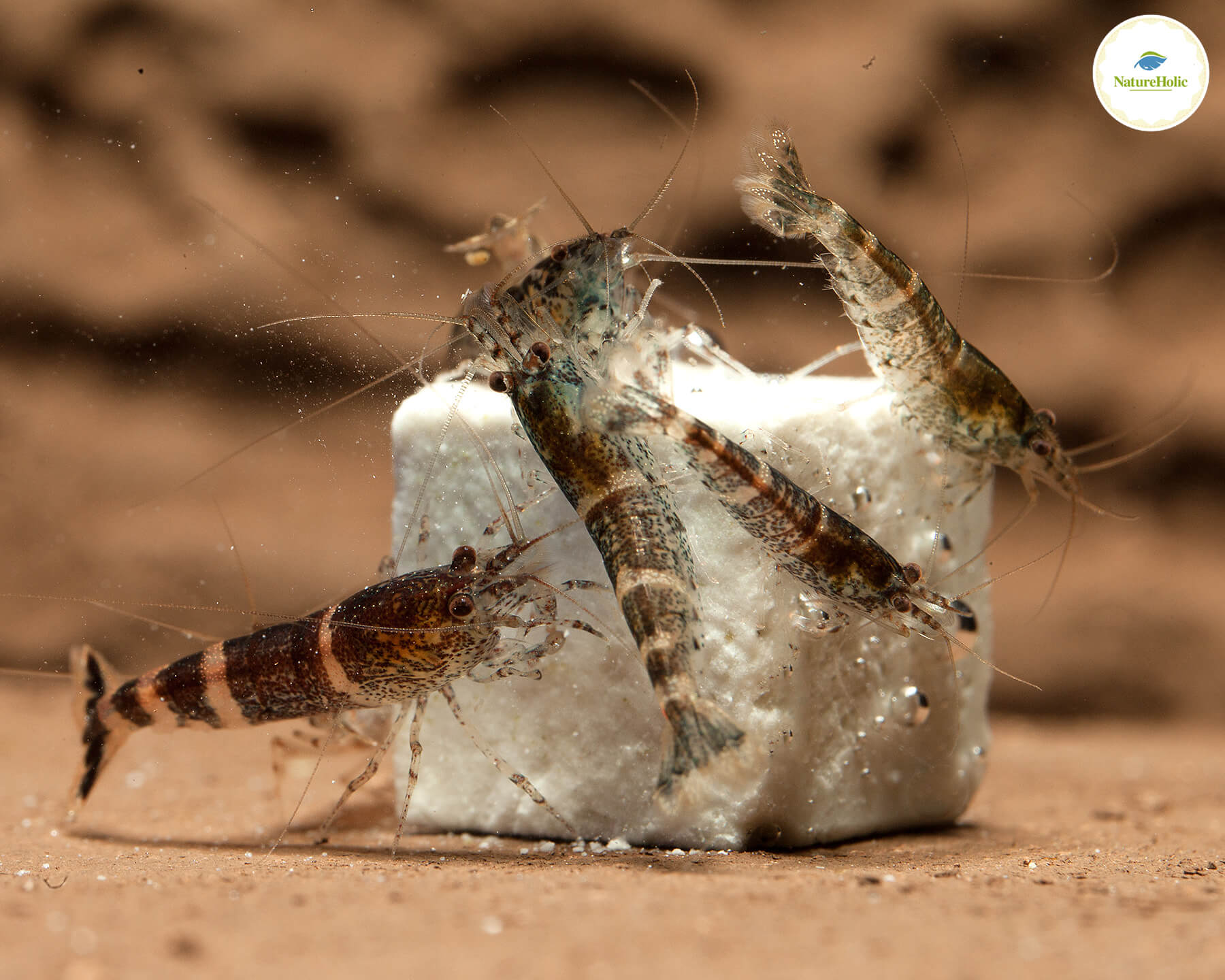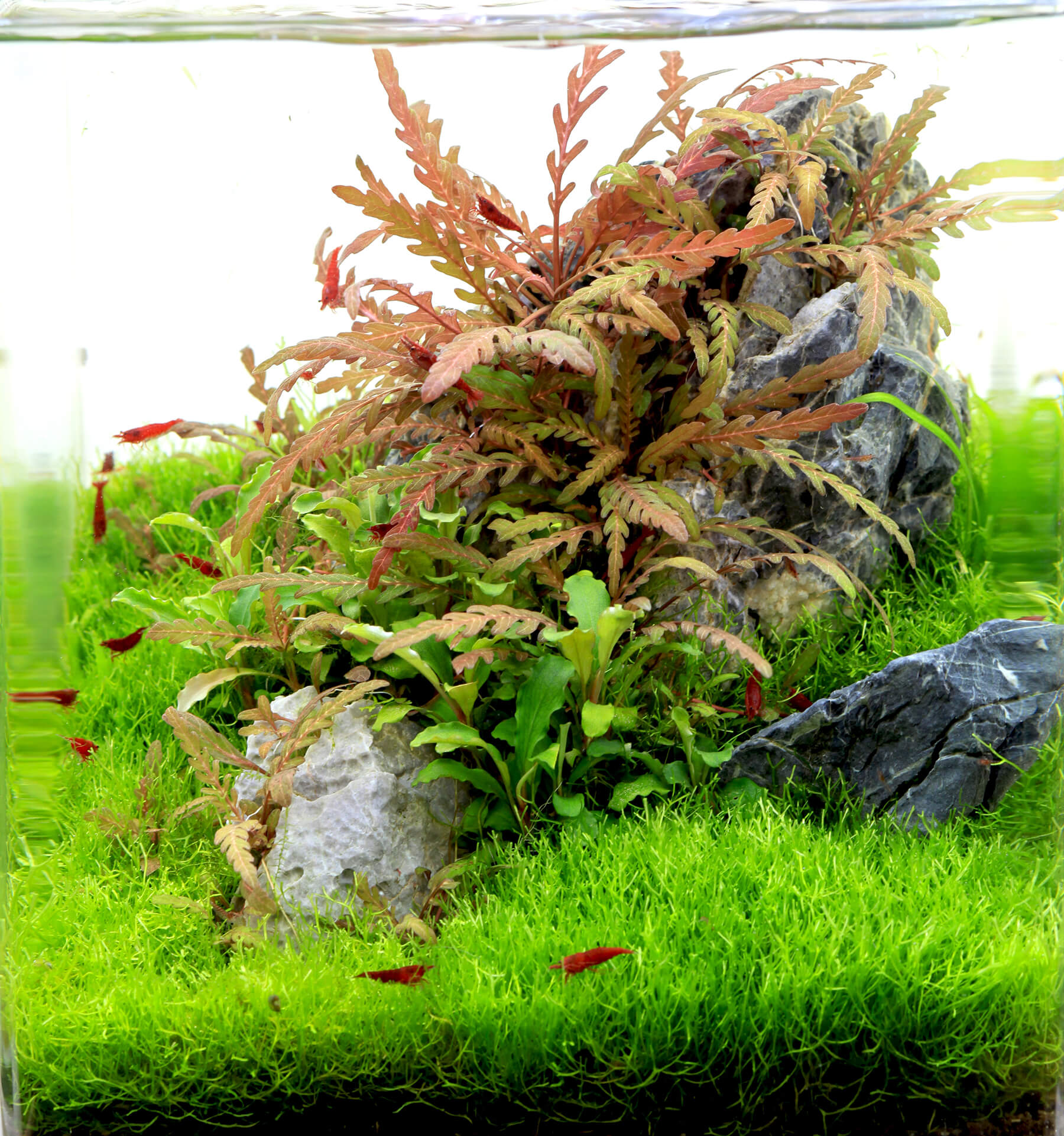Vitamins, minerals and trace elements - what do shrimp need?
Table of contents
- How do shrimp absorb vitamins, minerals and trace elements?
- What minerals do shrimp need?
- What vitamins do shrimps need?
For successful shrimp keeping, the right supply of vitamins and minerals is crucial. The health of the animals stands and falls with this, only then can they successfully molt and grow appropriately. The survival of the offspring also depends on the mineral and vitamin supply of all dwarf shrimp in the aquarium.
Unfortunately, there are very few studies on what vitamins, minerals and trace elements dwarf shr imp need in the aquarium. The main ones studied are their big siblings, the edible shrimps in aquaculture. These are predominantly saltwater species, but some principles about the needs of shrimp in freshwater aquariums can be derived from these studies.
Basically, shrimp needminerals and vitamins to keep their metabolism running, to absorb nutrients from food, to produce hormones and enzymes, to build body tissues, to stabilize their shell, and they also need the substances for egg formation and for fit offspring. A good supply of vitamins and trace elements is therefore really important for shrimp breeding in the aquarium. Algae are particularly rich in vitamins and minerals - the green algae Chlorella and Nannochloropsis stand out here, and among the blue-green algae the genus Spirulina.
How do shrimp absorb vitamins, minerals and trace elements?
Calcium (Ca+) can be taken from the water by the shrimp in the aquarium through calcium channels, but mainly shrimp take the minerals they need from the food. The same is true for vitamins. Shrimp in freshwater basically have the problem that they have to constantly provide osmoregulation - water always flows to the more saline solution, and in the shrimp the salt concentration is much higher than in the water surrounding it. Shrimp are therefore constantly actively engaged in getting rid of water so that they do not burst. For this reason, their mineral intake tends to be through their food, so they don't have to take in extra water, which they tend to want to get rid of anyway.
In nature, crustaceans - shrimps and crabs - eat practically everything they find in their biotopes. Microorganisms and algae coverings provide high-quality, easily digestible protein as well as minerals, trace elements and vitamins. Foliage that falls from the trees is also part of the shrimp diet, it also provides important minerals and fiber.
Shrimp have an increased need for minerals, trace elements and vitamins, especially during growth and when they reproduce. But they may also need more of these important elements when they are ill.

What minerals do shrimp need?
Minerals and trace elements are among the essential nutrients that shrimp cannot produce themselves, but must obtain from food. In shrimp feed, the proportion of minerals should be about 10%. On the label of the feed, the mineral and trace element content is indicated as crude ash. However, it is often not possible to see what this crude ash content is made up of.
Calcium and magnesium
Shrimp need calcium and magnesium primarily for a hard, solid carapace that protects them from attack and supports their body as an exoskeleton. Although shrimp can release minerals from their old skin and store them temporarily in the body, the new skin is larger, so the shrimp needs additional minerals to completely stabilize their new carapace.
In fact, the new skin is only hardened by the storage of minerals (mainly calcium carbonate, but also magnesium compounds) - but not only the skin. Important organs are also skinned during the moult: the mouthparts, the walking legs and also part of the forestomach. They also need to be resupplied with calcium after a moult - this is called calcification.
Calcium can actually also be absorbed by the shrimp from the water, although especially for species from soft water, calcium absorption via food plays a much greater role. Magnesium is also mainly absorbed from the food. If the shrimp does not take up enough calcium and magnesium, it can have moulting problems because its shell cannot harden properly.
Potassium
Potassium is an element involved in most physiological processes in the body's cells. Potassium regulates cell growth and cell communication, it can affect blood pressure, and it is involved in the production of various hormones. Even the digestion and utilization of carbohydrates and proteins in the shrimp 's digestive tract is dependent on potassium. Potassium is also absorbed from the food. As a rule, sufficient potassium is present in all natural tissues, so that a problem due to potassium deficiency rarely occurs in shrimp in the aquarium.
Copper
Excuse me? Shrimp need copper? That's toxic to them! Yes and yes. Although shrimp tolerate very little copper in the water, they need the trace element because their blood pigment, hemocyanin, is based on two copper atoms that bind the oxygen atom for transport. For this reason, a minimum amount of copper is absolutely essential for survival. The good news: the little bit of copper shrimp find is basically everywhere, it does not need to be fed extra. The natural copper content in shrimp food is perfectly sufficient.
Zinc
Shrimp need zinc in trace amounts to activate various enzymes and to form their body protein. Zinc is also a direct component of various enzymes, and it is needed for the formation of growth hormone in shrimp. Zinc is essential for healthy shrimp growth. Zinc is also present in shrimp's natural diet in adequate amounts when fed in a balanced manner.
Boron
Without boron there are no proteins, the trace element is absolutely necessary for protein synthesis. It also plays an important role in the transport of carbohydrates to the body tissues and growth zones.
Manganese
Manganese is an important cofactor necessary for proper functioning of quite different enzymes in the shrimp body. Also, manganese is a component of various enzymes.

What vitamins do shrimp need?
Shrimp can produce some vitamins on their own, while others they must obtain from food: They cannot produce vitamins A, C, D and E themselves. Shrimp also cannot absorb vitamins from the water, so they need a sufficiently vitamin-rich diet.
Vitamins A, C, D and E in particular are often added specifically to commercially available shrimp feed in order to enrich it with them. These feeds should not be heated above 80 °C or frozen for too long, so that the vitamins are not lost.
Vitamin D
Vitamin D regulates calcium absorption and phosphate metabolism in the shrimp gut. A deficiency of vitamin D in shrimp can therefore lead to molting problems, growth disorders and muscle necrosis. A deficiency of vitamin D can also be responsible for problems with the hardening of the new carapace.
Vitamin A
Shrimp need vitamin A for their immune system, for defense against infection and for smooth molting. Vitamin A is also important for cell growth and the formation of various tissues (egg formation, for example) - in other words, for healthy growth and for healthy reproductive readiness.
A deficiency of vitamin A can lead to increased susceptibility to disease, poor egg quality, lack of reproductive drive, and molting problems and deformities.
Vitamin A is absorbed in the form of its precursor beta-carotene and is then fully "finished" in the shrimp body. It is found in high amounts in algae and in red or orange vegetables.
Astaxanthin
Another carotenoid is the natural pigment astaxanthin, which is responsible for the color in red, blue, brown, green and black crustaceans. Astaxanthin also has a vitamin-like effect on shrimp. It can have a positive effect on reproductive fitness, fertility and immune defense in shrimp.
Astaxanthin is also found in high concentrations in algae (especially in the blood rain alga Haemococcus and in spirulina), as well as to a lesser degree in red and orange vegetables.
Vitamin C
Vitamin C is an important antioxidant that can eliminate harmful substances and even bacteria in the shrimp body. In addition, vitamin C can increase shrimp tolerance to toxic ammonia.
A deficiency of vitamin C can lead to molting problems and deformities.
Vitamin C is found in many plant foods, green dried foliage, seaweed and vegetables.
Vitamin E
The important antioxidant vitamin E is needed by shrimp not only to fight off harmful substances, but also for various metabolic processes, for normally functioning muscles, and for normal functioning of their nervous systems. Like vitamin C, vitamin E can help reduce shrimp sensitivity to ammonia.
Vitamin E deficiency may be manifested in neurological deficits and growth disturbances.
Shrimp absorb vitamin E primarily through green algae such as Nannochloropsis and Chlorella.
